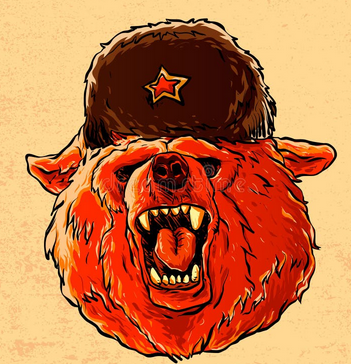There’s a very simple reason (but it’s not the only reason): A significant section of the Russian military was supportive of the Revolution. Whereas in Italy and Germany, the military was by and large in favor of the fascists, by the time they were ready to ascend to power. So, in Russia, the military facilitated the Revolution, whereas in Europe, the military crushed the Revolutions.
Especially in Germany, where the loss during WW1 was attributed largely to the Social Democrats (who were pushing for an armistice), and a poor leadership ranging from the monarch to the government, as well as the nobility and the higher echelons of the officer corps. Put simply, the military hated the “leftists” and didn’t really trust any other politicians except Hitler with his messages of strength, unity and revenge.
In Italy, the Vatican gradually grew in favor of Mussolini (which ended up resulting in the Vatican’s independence). Virtually every priest became a propaganda officer for fascism. As a result, the military was in support of Mussolini early on.
And a second reason to consider (again, there’s more reasons): The October Revolution shook things up in the rest of Europe. German communists were also getting ready to seize power, and it was clear things were about to happen in France, Spain, Italy, Poland, Romania, Bulgaria, Hungary and Greece. The capitalists and reactionaries in those countries coalesced to stop the communists before they could begin their own revolts, and they saw fascists as the natural solution. Especially in Italy, where the industrialists started heavily funding Mussolini almost immediately after he formed his movement.
There’s many other reasons, like the popular mentality and culture, the nihilism of Western European communists after the failures of the Paris Commune and the more recent Spartacist Revolt, the more developed capitalist forces that permeated every facet of government and security, the large labor aristocracy that inhabited the major population centers in those countries, etc.
Germany was a fascist dictatorship led by a to be Nazi party founder for most of the war.
This is just my opinion and i’m sure there’s a more scientific answer but i’d say it has a lot to do with imperialism. Germany and Italy were historically among the main imperialist powers and as such had both a population with a mentality shaped by imperialism/colonialism as well as the material preconditions that made them more prone to fascist takeover rather than socialist revolution. Russia, though it sounds paradoxical, was an empire in name but not a highly developed imperialist power in the way the western Europeans were.
Russia was very underdeveloped and its capitalist system was not yet fully established (having just emerged out of semi-feudal conditions), such that its capitalist class was too weak to be able to take undisputed control when the monarchy fell. In addition its population was not as accustomed as that of Western Europe to living in (comparative) luxury on the basis of colonial wealth extraction. Their population was still mainly peasant class and did not yet have a developed imperial core mentality of entitlement and superiority over other peoples.
On the other end of the scale you have Britain and France where you also didn’t see the kinds of fascist coups you saw in Germany and Italy. And this is to do with the fact that, certainly after the First World War, these were merely second tier imperialist powers, while Britain and France were the main colonial powers and were able to extract so much colonial plunder that their capitalist class did not consider open fascism necessary. They could still afford to bribe their population and maintain absolute control as well as high profits under a liberal-bourgeois “democratic” model.
In short it was not necessary to institute open fascist dictatorship in Britain and France because the dominance of the capitalist class there was absolute, their populations too docile on account of the benefits of living in the core of the two largest colonial empires in the world and so posed little to no threat of socialist revolution. Bourgeois “democracy” is the preferred system for capital under conditions of abundant super-profits and a politically neutered working class. Open fascism is sort of a last resort as it creates too much instability and opposition.
And this model has worked for a long time now in Europe and the Anglo colonial nations as they managed after the Second World War, through a mixture of material benefits and cultural indoctrination, to turn their populations into highly docile and servile cultures that had almost no thought of rebellion or uprising. This is now slowly changing as the material conditions for that are going away but the culture of capitalist bootlicking is still very much entrenched. That coupled with the pervasive racism and convictions of cultural superiority means that we are now again entering ideal conditions for fascism.
That’s the magic of fascism, it has the uncanny power of coopting people’s indignation with current reality and seduce them with easy answers, like you are fucked because THEM(pick your oppressed group here) are fucking you, therefore if we go to war with THEM everything will be wonderful, and that’s quite a false promise but it sounds true and people want to believe that something will change.
That being said both Germany and Italy had quite expressive communist movements, especially Italy, they would likely have made more of a splash in their after war elections had CIA not meddled with it. So it’s important to understand that both communism and fascism somewhat run on the same fuel, and a well organized vanguard can defend from fascist proliferation, and the same goes the other way, a strong fascist movement can take the wind out of communist movement’s wings. That’s one of thr many many reasons the hatred is so strong and mutual between the two groups, and why capitalism helps fascist movements when they fuck shit up
I wouldn’t say that communism and fascism run somewhat on the same fuel. I feel like that’s neoliberal apologia. But I 99 percent know that’s not how you meant it, and I definitely understand your sentiment. Both communists and fascists see the lie that is neoliberalism. The difference, is our reactions to it.
Communists want to create a society/system that is better for all people in general, and we’re angry that capitalism is only a carrot on a stick used to indoctrinate and browbeat the civilian populace. We’re angry that capitalist democracy is a sham.
Fascists are angry that neoliberalism is too “weak” or nice or not exploitative enough, and that the thin veneer of democracy should be stamped out for full a full dictatorship, that things are currently too democratic.
Yeah that’s why I said somewhat because I know its not quite correct but it was useful to answer the doubts of our comrade, but yeah I meant that they answer the same yearnings of the people, the yearning for change for a better life and the frustration with current reality, us by the real correct and future looking ways, the fascists with lies and backwards looking ways that always call for a return of a fabled past
The Imperial Russian state had also almost completely disintegrated in large parts of the country. The disastrous campaigns on the Eastern Front resulted in the mobilization of large numbers of able-bodied men from the rural state security forces, while also producing massive waves of deserters, many of whom dispersed into the countryside and became bandits preying on travellers and the peasantry. When the revolutionaries stepped up, and especially when the Bolsheviks took power, they returned state control and infrastructure to these areas, solidifying them as the only legitimate state power. Meanwhile in Germany, although losing WW1 shook up the state and got the Kaiser deposed, the state never lost control over its territory in the same way. And as OrnluWolfjarl says, when the Imperial Army recalled units from the front line to crush the communists, by the time they’d marched all the way back to the heartlands a majority of the soldiers had changed allegiance and just joined the Red Army instead.
Why did so many join the Red Army? Do you think it was moral?
The communists had taken a firmly anti-war stance, or more precisely a ‘revolutionary defeatist’ stance: their position was that WW1 was an inter-imperialist war between capitalist powers (over who would win control of the European colonies in Africa, Asia and to a lesser extent South America) with the only real loser being the members of the working class sent to the slaughter at the front lines. Therefore, instead of fighting each other, the workers of each nation should fight against their own government, bringing the war between countries to an end by turning it to a civil war within each participating country, to overthrow the capitalist states and create new workers’ states - or, failing that, to at least stop the slaughter of working people for the capitalists’ benefit as soon as possible. As part of this, they firmly and vocally opposed Imperial Russia’s part in WW1 and made it the leading part of their slogan, “Peace, land and bread”.
This being the Bolshevik position would have been widely known throughout Russia, especially among the working-class conscript soldiers sent to die in the trenches, so when they were ordered back to Russia in order to crush the communist uprising, just so they could then be sent back into WW1 again without any further distractions, a large part of them naturally rebelled.
This is also why the October revolution happened just months after the February revolution that deposed the Tsar - the “social democratic” bourgeoise government that took control of the country, having promised to end Russia’s part in the war as soon as possible, quickly started drafting plans to send more troops to the frontline. This was completely intolerable to the Bolsheviks, who had previously been content with the overthrow of absolute monarchy, but now having been immediately betrayed by the liberals (many such cases) instead overthrew them too and made certain Russia withdrew from WW1, even at the cost of a deeply unfavorable peace settlement.
Indeed, the brainworms over how Russia needed to stay in the war and keep throwing workers to their deaths to eke out a little more inter-imperialist gain were so ingrained that it was the motivation for the assassination attempt against Lenin, complications of which almost certainly led to the series of strokes a few years later that led to his death.




